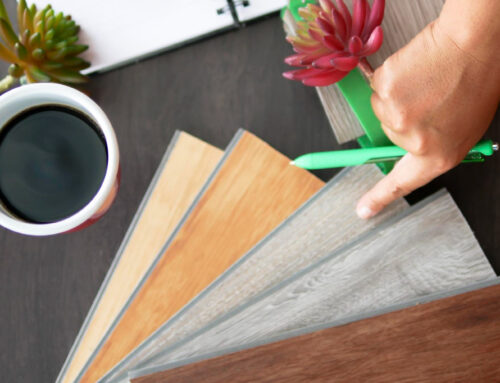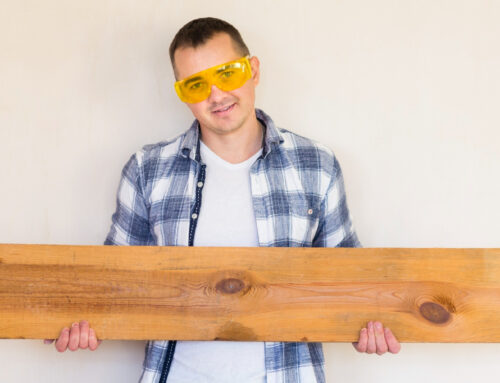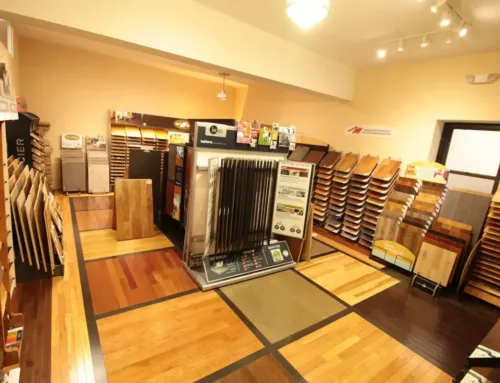Bulk vinyl plank flooring offers significant cost savings and ensures consistent styling across large projects. Order 10-15% extra material to account for waste and installation errors. Choose between LVP, WPC, or SPC types based on your needs. Calculate your square footage accurately and compare suppliers for the best pricing. Professional installation requires proper subfloor preparation and the right tools.
- LVP offers flexibility, WPC provides comfort underfoot, and SPC delivers maximum durability
- Bulk orders typically require minimum quantities but offer wholesale pricing.
- Most vinyl planks install without acclimation and work well in high-traffic areas.
The flooring budget just got a major upgrade. Smart property owners are revolutionizing their renovation approach, and this change comes from discovering how best luxury vinyl plank flooring delivers the perfect combination of style, durability, and affordability. Gone are the days of paying premium retail prices for quality floors.
If you’re tackling a whole-home makeover, upgrading multiple rental units, or managing a commercial project, bulk ordering delivers consistent results without the sticker shock. Smart buyers are achieving substantial savings while getting the polished, professional look they want.
Start planning your bulk flooring project with Rustic Wood Floor Supply’s expert guidance. Our specialists help you calculate exact quantities and select the perfect vinyl planks for your space.
Get Free Project Consultation: (678) 691-0533
What is Vinyl Plank Flooring?
Vinyl plank flooring consists of multiple layers of synthetic materials designed to mimic natural wood or stone. The core typically contains PVC, limestone, or wood fibers that provide stability and durability for both residential and commercial applications.
Key benefits make vinyl planks popular for both residential and commercial use:
- Waterproof protection: Perfect for kitchens, bathrooms, and basements
- Scratch and dent resistance: Handles heavy furniture and pet claws
- Easy maintenance: Simple cleaning with regular mopping
- Cost-effective: Significantly cheaper than hardwood or natural stone
- Quick installation: Most types click together without glue
Types of Vinyl Plank Flooring
1. Luxury Vinyl Planks (LVP)
LVP features a flexible vinyl core with realistic wood or stone patterns. The material bends easily and works well over minor subfloor imperfections, making it popular for DIY installations. This type offers excellent value for residential applications where extreme durability isn’t the primary concern.
Pros: Lower cost, comfortable underfoot, good for DIY installation
Cons: Less durable than WPC/SPC and may show dents under heavy furniture
2. Wood-Plastic Composite (WPC) Vinyl Planks
WPC planks contain a wood fiber and PVC core that provides extra cushioning and sound absorption. This construction creates a warmer, more comfortable walking surface compared to traditional vinyl. The enhanced thickness also helps bridge minor subfloor irregularities effectively.
Pros: Quieter footsteps, warmer feel, excellent moisture resistance
Cons: Thicker profile, higher price point, requires expansion gaps.
3. Stone-Plastic Composite (SPC) Vinyl Planks
SPC uses a limestone and PVC core for maximum stability and durability in challenging environments. These planks handle temperature fluctuations better than other vinyl types and resist indentation from heavy furniture. Commercial applications often prefer SPC for its superior performance characteristics.
Pros: Extremely durable, stable dimensions, works over concrete
Cons: Harder underfoot, may require additional underlayment
| Feature | LVP | WPC | SPC |
|---|---|---|---|
| Durability | Good | Better | Best |
| Comfort | Good | Best | Fair |
| Price | $ | $$ | $$$ |
| Installation | Easy | Moderate | Easy |
Key Features to Consider
Plank Thickness
Vinyl plank thickness ranges from 2mm to 12mm, directly impacting durability and performance. Thicker planks provide better sound dampening, feel more solid underfoot, and resist damage from dropped objects or furniture movement.
- 2-4mm: Budget option for light residential use
- 5-7mm: Standard residential thickness with good durability
- 8-12mm: Premium thickness for commercial or high-traffic areas
Wear Layer and Durability
The wear layer protects against scratches, stains, and fading from daily use. Measured in mils (1/1000 of an inch), this transparent coating determines how long your floors will maintain their appearance under traffic.
- 6-12 mils: Light residential use
- 12-20 mils: Standard residential applications
- 20+ mils: Commercial and heavy-traffic areas
Underlayment Options
Underlayment choices affect comfort, sound control, and installation requirements. Some vinyl planks include attached padding, while others require separate underlayment installation. The right choice depends on your subfloor conditions and performance goals.
- Attached underlayment: Saves installation time and provides consistent cushioning
- Separate underlayment: Allows customization for specific acoustic or comfort needs
Edge Finishing
Edge profiles impact both appearance and installation requirements. The choice between beveled and square edges affects how your finished floor looks and how planks fit together during installation.
- Beveled edges create distinct plank separation for a realistic wood look
- Square edges provide a seamless appearance with minimal gaps
Why Order Vinyl Plank Flooring in Bulk?
Here are a couple of reasons for ordering vinyl plank flooring in bulk:
Cost Savings and Price Advantages
The biggest reason to order vinyl plank in bulk is cost savings. Most suppliers start volume discounts at 1,000–2,000 sq. ft., and the price per box keeps dropping as you order more. Since bulk orders lower shipping and handling costs, suppliers pass those savings directly to you. Also, it is perfect for large projects or multi-room renovations.
Consistency in Flooring Color/Style
Manufacturing runs can vary slightly in color and texture between production batches. Ordering all your material from the same lot ensures perfect color matching across your entire project, eliminating visible variations. This consistency becomes critical in open floor plans where color variations would be noticeable.
Bulk Ordering for Projects
Large projects benefit most from bulk ordering advantages. Whether residential, commercial, or new construction, bulk purchasing ensures material availability and consistent pricing throughout your project timeline.
- Residential: Whole-home renovations, multi-unit properties, rental portfolios
- Commercial: Offices, retail spaces, restaurants, healthcare facilities
- Construction: New builds, apartment complexes, housing developments
How Many Planks/Boxes Do You Need?
Calculating Area Coverage
Start by measuring each room’s length and width in feet accurately. Multiply these numbers for square footage, then add all rooms together. Don’t forget closets, hallways, and other floored areas in your calculations.
Example: 12′ x 15′ living room = 180 sq ft + 10′ x 12′ bedroom = 120 sq ft = 300 total sq ft
Allowing for Extra Material
Always add 10-15% extra to your order. This covers cutting waste, installation errors, and leaves you with spare planks for future repairs, which is critical for maintaining a perfect color match later. Complex layouts with many angles require higher waste percentages.
- Cutting waste: End pieces and irregular cuts around obstacles
- Installation errors: Damaged planks during installation
- Future repairs: Matching planks for damage or wear replacement
Bulk Order Calculators
Most suppliers provide online calculators that simplify quantity estimation. Input your total square footage, and they’ll recommend the exact number of boxes needed based on coverage per box specifications. Standard box coverage ranges from 20-30 square feet, depending on plank size.
Partner with Rustic Wood Floor Supply for accurate project estimation and branded material sourcing.
Where to Buy Bulk Vinyl Plank Flooring
Wholesale Suppliers and Manufacturers
Direct manufacturer relationships offer the best pricing for large orders. Many manufacturers sell directly to contractors and bulk buyers, eliminating middleman markups. Regional distributors often provide competitive pricing with faster delivery times.
What to Look for in Bulk Providers
Choose a bulk supplier with a wide product selection, clear volume pricing, reliable delivery, and solid customer support. Verify their return policies, minimum order requirements, and ability to provide technical assistance throughout your project.
- Product selection: Wide variety of styles, colors, and quality levels
- Pricing structure: Clear volume discounts and minimum order requirements
- Shipping capabilities: Reliable delivery to your location with appropriate equipment
- Return policies: Reasonable terms for defective or excess material
- Technical support: Installation guidance and product specifications
Sample programs let you evaluate products before committing to large orders.
Step-by-Step Bulk Ordering Process
1. Comparing Products and Samples
Request samples of 3-5 products that meet your specifications and budget. Compare them in your actual space under different lighting conditions throughout the day. Consider traffic patterns and aesthetic preferences carefully.
2. Getting Price Quotes
Contact multiple suppliers for detailed quotes on your exact square footage requirements. Provide specific details about delivery location, timeline, and payment preferences. Compare total project costs, not just per-unit pricing.
- Total square footage needed
- Preferred product specifications
- Delivery location and timeline
- Payment terms preferences
3. Ordering and Payment
Most bulk suppliers accept credit cards, bank transfers, checks, and financing options for qualified buyers. Confirm delivery schedules and any special handling requirements for your location before finalizing your order. Delivery timelines typically range from 1-3 weeks, depending on product availability and location.
Installation Considerations
Preparing for Bulk Installation
Large installations require careful planning and adequate preparation time. Check that your subfloor is level, clean, and dry before delivery. Schedule enough labor and tools in advance. Skipping this step leads to uneven floors, delays, and voided warranties.
The commercial construction sector is projected to grow by 4.2% annually, driving demand for professional installation services.
- Subfloor requirements: Level, clean, dry surface within manufacturer specifications
- Tool inventory: Ensure adequate cutting tools, spacers, and installation equipment
- Labor planning: Schedule sufficient installers for your timeline
Installation Types
Choose installation methods based on your subfloor conditions, traffic expectations, and budget constraints. Each method has specific advantages for different applications and skill levels.
- Click-lock systems work well for DIY installation and most residential applications.
- Glue-down installation provides maximum stability for commercial spaces
- Loose lay options require minimal prep but work best in smaller areas
Professional Installation Tips
Stagger plank joints at least 6 inches between rows for structural integrity and visual appeal. Maintain proper expansion gaps around perimeters and transitions. Follow manufacturer specifications exactly to preserve warranty coverage.
Maintenance and Care
Cleaning Recommendations
Regular sweeping and damp mopping keep vinyl planks looking new for years. Avoid harsh chemicals that can damage the protective wear layer. Use manufacturer-approved cleaning products for best results and warranty protection.
Repair and Replacement
Individual planks can be replaced if damaged without affecting surrounding areas. Having extra planks from your original bulk vinyl plank flooring order ensures perfect color matching for future repairs and maintains your floor’s uniform appearance.
Long-term Durability
Quality vinyl planks can last 15-25 years with proper maintenance and care. The wear layer thickness directly impacts longevity in high-traffic areas. Regular maintenance extends lifespan and preserves appearance significantly.
Common Mistakes to Avoid
Ordering Wrong Specifications
Verify thickness, wear layer ratings, and installation methods before placing bulk orders. Returns on large quantities can be costly and time-consuming. Double-check all specifications against your project requirements before ordering.
Miscalculating Coverage
Double-check your square footage calculations using multiple measurement methods. Ordering too little delays your project, while ordering too much ties up unnecessary capital. Include all areas that need flooring in calculations.
Overlooking Installation Prep
Factor subfloor preparation costs and timeline into your project budget early. Poor prep work leads to installation problems and voided warranties. Ensure your subfloor meets all manufacturer requirements before material delivery.
Bottom Line
Bulk vinyl plank flooring transforms large flooring projects from expensive challenges into cost-effective success stories. The key lies in understanding your specific needs, calculating quantities accurately, and partnering with reliable suppliers who offer consistent quality and competitive pricing. Smart buyers who plan and order strategically can achieve professional results while maximizing their budget effectiveness compared to retail purchases.
Rustic Wood Floor Supply brings decades of expertise to your bulk flooring projects. We understand that every square foot matters when you’re covering large areas, which is why we’ve built relationships with top manufacturers to bring you unbeatable bulk pricing without compromising on quality. From initial planning to final installation, we ensure your investment delivers lasting value and stunning results.
Talk To Experts Now: (678) 691-0533
Explore Our Vinyl Plank Flooring Collection: https://rusticwoodfloorsupply.com/flooring/luxury-vinyl/
Frequently Asked Questions
How much extra vinyl plank flooring should I order for waste?
For bulk orders, plan to purchase 10–15% more vinyl plank flooring than the calculated area to cover, cutting waste and installation errors.
Can I mix different brands or batches of vinyl plank flooring in one order?
It is not recommended to mix brands or batches because slight differences in color, thickness, or texture may result in an uneven appearance after installation.
Does bulk vinyl plank flooring require acclimation before installation?
Most luxury vinyl planks with rigid SPC or WPC cores do not require acclimation and are ready for immediate installation, but always follow manufacturer recommendations.
What payment options are available for bulk vinyl plank flooring orders?
Bulk vinyl plank suppliers usually accept credit cards, bank transfers, checks, and PayPal; some offer financing for larger purchases.
How do I calculate the number of boxes needed for my space?
To estimate the amount needed, multiply the room’s length by width for total square footage, then use a flooring calculator to determine boxes based on coverage per box.
Is vinyl plank flooring suitable for high-traffic commercial areas?
Yes, commercial-grade vinyl plank flooring with a thick wear layer is highly suitable for high-traffic areas due to its durability and low maintenance.
Author Profile
- I have worked in hardwood flooring for the last 8 years. Use to run a company of residential crews as well as a company with gym flooring. If you need floor installation or refinishing help, I should have an answer or at least get you in the right direction.
Latest entries
 FlooringJanuary 10, 2026What Wood Floor Color Do I Choose?
FlooringJanuary 10, 2026What Wood Floor Color Do I Choose? FlooringJanuary 5, 2026How to Clean Your Wood Floors the Right Way
FlooringJanuary 5, 2026How to Clean Your Wood Floors the Right Way FlooringJanuary 3, 2026Which Hardwood Is Right For You?
FlooringJanuary 3, 2026Which Hardwood Is Right For You? FlooringDecember 24, 2025Right Advice For Picking The Ideal Hardwood Flooring Options
FlooringDecember 24, 2025Right Advice For Picking The Ideal Hardwood Flooring Options




